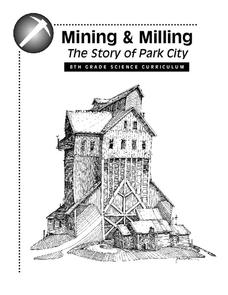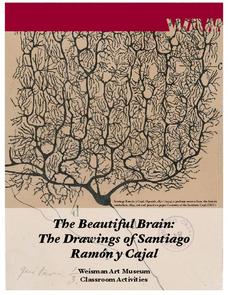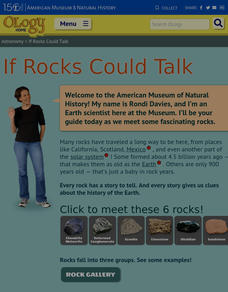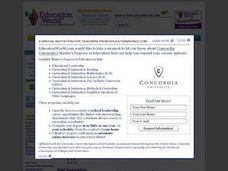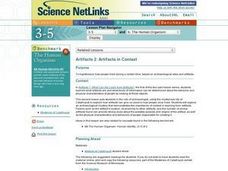Museum of Tolerance
The Role of Citizens in a Participatory Democracy
Groups research participatory democracies and compare the role and rights of citizens in ancient history with those in recent U.S. history. Guided by a series of questions, individuals compose a persuasive essay in which they discuss the...
Curated OER
History of the Masons
Students are divided into groups and follow directions of their group leaders and complete a worksheet while on site.
American Museum of Natural History
Field Trip Mars
Fly around the Martian surface. Pupils view a presentation on the planet Mars featuring a flyover that shows different views of the surface where rovers have landed and explored on different missions. As individuals watch the images, the...
Curated OER
The Wright Stuff
In this lesson plan, students design an exhibition on the history of aviation for a science museum. For homework, they write short stories envisioning the future of flight in the year 2014.
Curated OER
Life in Ancient Mesopotamia
Students reconstruct and make drawings of vessels in the same manner as an archaeologist. In this archaeologist lesson plan, students each get a piece of a broken pot and they have to work together to put it back together. Once it is...
National Gallery of Art
Islamic Art and Culture
Provided by the National Gallery of Art in Washington, this resource for teachers examines Islamic art, including calligraphy, arabesques, and geometric designs. A recounting of the spread of the faith and the tumultuous political...
Curated OER
Green Transportation System
Consider the effects of green transportation. In this environmental stewardship lesson, determine how transportation has changed throughout history and then collaborate to solve New York City transportation issues.
Curated OER
Combating Corrosion
Study corrosion on bronze statues with a hands-on instructional activity. As pupils place a penny in water with salt, they observe the changes in the penny throughout a period of a week. They then analyze the pre-conservation and the...
Curated OER
The African Burial Ground
Students analyze African American burial grounds. In this African American history lesson, students draw conclusions about African American communities in early New York and consider how archeology made it possible to study the communities.
University of Minnesota
Beautiful Brain: Do You See What I See?
Can art play tricks on your eyes, and can a still painting really appear to vibrate? The second instructional activity in a four-part series discusses the way our beautiful brains translate visual images. It highlights the style of...
University of Minnesota
Beautiful Brain: Step Inside the Brain
Before digital microscopes, scientists hired artists to draw the things visible in the microscope. Through training in neuroscience and art, Cajal revolutionized the way we view the beautiful brain. The third lesson in a series of four...
Park City Historical Society & Museum
Mining and Milling: The Story of Park City
Study the chemistry of mining! Through nine lessons in the unit, learners explore different concepts related to mining. Their study ranges from rock and mineral analysis to the environmental impact of dynamite and the chemical reaction...
University of Minnesota
Beautiful Brain: Brain Inspiration
"Neuroscientists consider Cajal as important to their discipline as Einstein is to physics." The first of four lessons has scholars view Santiago Ramon y Cajal's drawings of neurons. They reflect and respond to the art through writing...
American Museum of Natural History
Being a Conservation Biologist: Eleanor Sterling
Eleanor Sterling responds to 21 questions posed by young learners about the challenges she faces as a woman conservation biologist. She also discusses her research of the aye-aye, an unusual animal that lives in Madagascar.
University of Minnesota
Beautiful Brain: Strangest Dream
Do words change or add meaning or interest to a work of art? The final lesson in a four-part series on the beautiful brain as a work of art focuses on art analysis. Scholars write a story about exploring art from the inside. Reflections...
American Museum of Natural History
If Rocks Could Talk
Meet some interesting rocks. Learners discover information about the three types of rocks and different rocks that are within each group. They read imaginary interviews with six rocks as each rock tells the story of their formation and a...
Brooklyn Children’s Museum
Rocks and Minerals in Our Lives
Young geologists discover the important role that rocks and minerals play in our everyday lives through this series of hands-on activities. Starting off with a lesson that defines the difference between plants, animals, and minerals,...
American Museum of Natural History
Journey to Deep Sea Vents
Take a deep dive into oceanography. The online interactive allows for learners to board a submersible to dive to the bottom of the ocean to investigate sea vents. On the way down, individuals see different marine life at different...
Montana Natural History Center
Studying Grassland Ecosystems
At first glance, grassland ecosystems might seem dull and uninteresting, but once you start to explore it's amazing the things you'll find! Through this series of engaging lessons, activities, and experiments, elementary students examine...
Curated OER
Then, Now, and Tomorrow
Students will use this unit to investigate the past, present, and future of the architecture and plan of New York's Lower East Side. Students will research the history of the Lower East Side neighborhood in photographs used from the...
Curated OER
2105
Students read excerpts from Jon Scieszka's novel, 2095, prior to presenting their vision of the future in a creative project accompanied by written explanation. They design a museum exhibit which shows a scene from a science fiction book...
Curated OER
Make A Mummy: The Science of Mummification
Students research the history of mummification. They work together to create an apple mummy. They write a paragraph about what they gathered while doing the experiment.
Curated OER
Yerbas y Remdios: A New Look
Students explore human health by participating in a medicine class activity. In this herbs instructional activity, students identify plants which Native Americans used throughout history to cure illnesses. Students research specific...
Curated OER
Artifacts 2: Artifacts in Context
Students explore world history by completing artifact worksheets. In this archaeology instructional activity, students identify the importance of finding clues when researching historical information by utilizing artifacts. Students...













